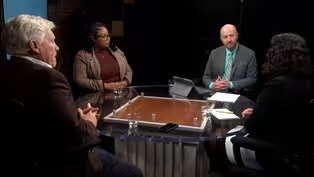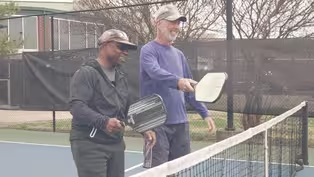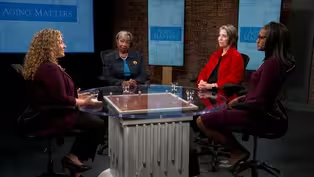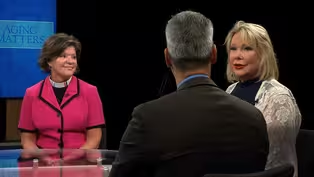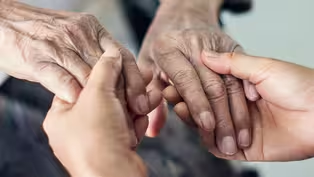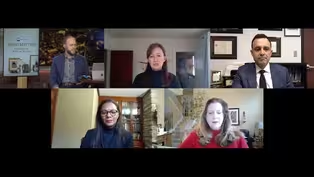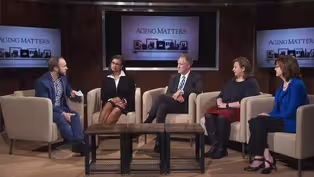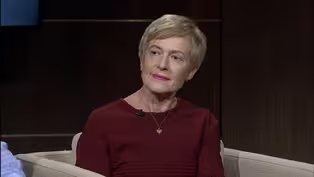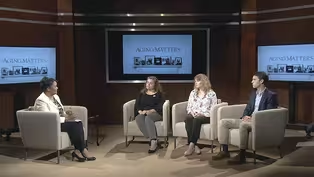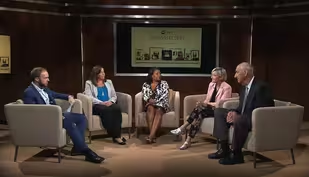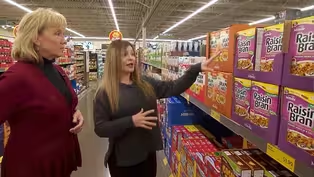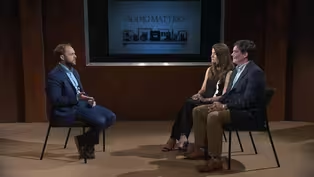
Raised by Grandparents Panel Discussion
Special | 25m 8sVideo has Closed Captions
Individuals discuss both the challenges and the benefits of being raised by grandparents.
Nearly 2.5 million U.S. children are being raised by a grandparent or relative, and more than 18 percent of those grandparents are living in poverty. Typically, these arrangements last 5 years or more, exacerbating the financial strain on grandparents and limiting the resources available to their grandchildren. How can we better support these families? We turn to the grandkids for answers.
Problems playing video? | Closed Captioning Feedback
Problems playing video? | Closed Captioning Feedback
Aging Matters is a local public television program presented by WNPT

Raised by Grandparents Panel Discussion
Special | 25m 8sVideo has Closed Captions
Nearly 2.5 million U.S. children are being raised by a grandparent or relative, and more than 18 percent of those grandparents are living in poverty. Typically, these arrangements last 5 years or more, exacerbating the financial strain on grandparents and limiting the resources available to their grandchildren. How can we better support these families? We turn to the grandkids for answers.
Problems playing video? | Closed Captioning Feedback
How to Watch Aging Matters
Aging Matters is available to stream on pbs.org and the free PBS App, available on iPhone, Apple TV, Android TV, Android smartphones, Amazon Fire TV, Amazon Fire Tablet, Roku, Samsung Smart TV, and Vizio.
Providing Support for PBS.org
Learn Moreabout PBS online sponsorshipMore from This Collection
Learn more about the issues facing an aging population from a panel of experts and community members discussing various topics on aging for Nashville Public Television original series NPT Reports: Aging Matters.
Affordable Housing in Nashville
Video has Closed Captions
As the cost of housing surges in Nashville, we pause to consider a more affordable future. (26m 46s)
Video has Closed Captions
A discussion about making the most of our time and abilities as we age. (26m 46s)
Video has Closed Captions
Experts discuss what has to change to give older women the quality of life they deserve. (26m 46s)
LGBTQIA+ Resources in Middle Tennessee
Video has Closed Captions
A discussion of health and social services available for older Middle TN LGBTQIA+ adults. (26m 46s)
Long-Term Care: Know Your Options
Video has Closed Captions
A conversation exploring long-term care options in Tennessee and their affordability. (26m 46s)
Video has Closed Captions
Experts discuss how older adults can stay safer-at-home during the COVID-19 pandemic. (27m 9s)
Legal Help Panel Discussion | Aging Matters | NPT Reports
Video has Closed Captions
NPT’s Aging Matters: Legal Help sheds light on resources for legal assistance. (27m 24s)
Hospitals & Health Risks Panel Discussion | Aging Matters
Video has Closed Captions
A panel of experts discusses strategies for a safe hospital stay. (28m 39s)
Loneliness & Isolation Panel Discussion | Aging Matters
Video has Closed Captions
Brent Elrod, Gretchen Funk and Andrea Prince discuss issues of loneliness and isolation. (28m 32s)
Dental Health Panel Discussion | Aging Matters
Video has Closed Captions
Experts discuss SMILE ON 60+, an initiative aiming to improve oral health in older adults. (27m 16s)
Video has Closed Captions
Aging Matters: Practical Nutrition offers simple tips and advice. (28m 31s)
Aging & the Workplace Panel Discussion | Aging Matters | NPT
Video has Closed Captions
Aging & the Workplace Panel Discussion (32m 59s)
Providing Support for PBS.org
Learn Moreabout PBS online sponsorship- Hello, I'm Mia McNeil, State Director for AARP Tennessee and moderator for this special panel discussion.
Recognizing and supporting grandfamilies is so important and a priority focus of the work we do statewide at AARP.
I'm grateful to be part of this discussion here on Nashville PBS.
Across the country, we are seeing the growing role of grandparents raising grandchildren.
As of September, 2024, more than 2.4 million children are being raised by kinship caregivers in the United States, and we know the financial impact is significant.
18.3% of grandparents responsible for their co-resident grandchildren live in poverty, and right here in Tennessee for every one child raised by kin in foster care, 66 are being raised by kin outside of foster care.
That's more than 80,000 grandfamilies in our state.
Nashville PBS's "Aging Matters" documentary, "Grandparents Raising Grandchildren" offers a unique perspective from the grandparents' point of view.
But in this discussion, we're going to turn the lens and feature the perspective of three individuals who were raised by their grandparents.
In just a moment, we'll hear from Pam MacArthur, a retired social worker, dog lover, and church volunteer.
Christina Dowling, a high school junior who enjoys running and art.
And Dr. Cephas Ablakwa, Director of Education and Engagement at Central Tennessee PBS who was raised in Ghana.
As I mentioned, each of our panelists will share their own personal experience being raised by their grandparents.
Thank you all for taking the time to join us, and thanks again to Nashville PBS for creating this opportunity to talk about grandfamilies.
I know each of you have lots to share today, so let's get started.
So, Pam, let's start with you.
How did you come to be raised by your grandmother and what were some of the challenges for each of you?
- Well, my parents divorced and neither were really capable of raising a child.
My mother was not at all interested in having a child.
And so my grandmother, who was my paternal grandmother, she got custody of me.
My mother was somewhat abusive because of her own mental health issues.
And so my grandmother was, she had lost her husband and we came together.
When I was born, I actually went straight home from the hospital with my grandmother.
And so I really bonded very well with her.
Much more, I felt safe with my grandmother, whereas I did not feel safe with my parents.
- And we know that things like love and affection and a sense of stability, that can be critical to a child's wellbeing.
Was your grandmother able to provide that for you?
- She really was my savior.
I really believe I would not be alive today if it were not for my grandmother.
My mother was pretty abusive and if I had had to live with her, I just would not have survived.
And so my grandmother was a teacher.
She was well educated, but she raised me without the help, financial help of either parent.
Teachers back in the '50s got maybe $7,000, $8,000 a year, annual salary, and she made it work.
She was nurturing, she gave me a purpose.
But one of the things that I think all children that are not living with their parents, one or both parents, is that sense of abandonment.
And I always felt like I was not wanted, even though my grandmother wanted me, it was that sense of abandonment from my parents that I've lived through my entire life.
And it wasn't until I was in my 40s that I sought emotional help for that.
So even though she provided a strong, stable, very moral environment for me, I still needed help.
And I think pretty much everybody that has been abandoned by their parents need that help.
- Now, Christina, you are currently being raised by your grandparents.
How do they support you in things like daily school and life?
- Yes, I am.
I really enjoy it and thankful for them.
My grandparents are a great help at driving me and my sisters to school every day and providing us with meals and clothes and just club activities we wanna do and sports.
They're helping us with like our academics, with like tutoring, and our mental wellbeing with therapy every week, which is very helpful.
- Yeah, and I'm sure you're really grateful to your grandparents for what they've done, but you also feel a range of other emotions that are associated with this.
Can you talk to me a little bit about that?
- Yeah, it's great to have our grandparents raise us because they're able to support us more than our parents could.
But sometimes I feel kind of jealous of my other friends and they get to live with their parents every day and we just don't have time and availability to do many activities that my friends get to do, you know, like go out to eat all the time or go hang out late hours.
But I just think it's a little bit of like sadness sometimes, but still very helpful for them.
- Yeah, and I imagine it can be challenging to talk to your peers about living in a grandfamily situation.
Tell me a little bit more about that.
- Yeah, some people, I don't always feel comfortable sharing it with, 'cause a lot of people just don't understand, since they haven't lived with their grandparents, it's so much easier to normalize living with your parents.
So some people I would talk to would kind of like pity me not living with my parents, but some people would try to be understanding even though they don't know the full picture of how it is.
- What do you do to process those thoughts and feelings?
What type of outlet do you have?
- I would say like talking to my sisters or my grandparents are great outlets too, just to tell them about it.
And if I just have a really close friend, just like vent to them about it.
They don't have to understand, but just getting to hear from them.
- And, as I mentioned a little bit earlier, you like to run and you love art.
Do you find those as outlets for you also?
- Yeah, whenever I feel like stressed or kind of upset sometimes with not being able to do certain things 'cause my grandparents don't have the time or like money sometimes, I like to find my own ways to have fun, like drawing, kind of sketching out how I feel or just going on like a mile or three mile run every day.
- I love the mile or three mile run.
So dedicated.
Cephas, you were raised in Ghana where the family structure is often different from what we're accustomed to in the United States.
How did you come to be raised by your grandmother and how was it different from life in most US homes?
- So my biological father died when we were two.
And so my mom moved back to, we have this concept called the family home.
So she moved back to the family home where her mother, who my grandmother lived.
And then I think she started a business where she traveled.
And so as she traveled and worked in the United States, probably even in London, I think, she ended up meeting another man.
And so from there, I think they were ready to bring us over.
But the paperwork, immigration just took years and years and years.
So by default, as she was away, we were staying, my sister and I were staying with my grandmother.
So, but in that culture, it's very, very normal to have more of a communal or family perspective or family way of raising kids.
So that was not unusual.
Different from her situation where it was not any type of feeling about that because most people, even they were raised by their biological parents typically live in a family home, so they still have their grandparents and aunts and uncles that chip in with raising them.
So to me that was, it was different, but not as much as it would've been if I was in the United States in those earlier years.
- Yeah, interesting.
So Pam, not only were you raised by your grandparent, but you also spent decades as a clinical social worker.
So talk to us about the long-term emotional impact of parental rejection and the fears of abandonment.
- Oh goodness.
Well, my grandmother instilled a very strong belief that education was everything.
And that was the one thing that she wanted to make sure that I sought.
And as a teenager I could have cared less, I just wanted to do my own thing.
But since then, those voices of get an education, you know, you need to be successful.
I think she would be very proud of me today for having two master's degrees.
She probably wouldn't believe it.
And so, but I have been successful as a social worker.
I found my calling as a social worker, always felt the need to help others.
And I think that came from her because I was always so terrified of losing her that it used to drive her crazy, my hovering behavior, 'cause what would that mean for me if she died?
And so there was a sense for me, I needed to make sure that she was safe just as she made sure that I was safe in early years.
And so when I found social work, that was my calling from God.
And once I got into social work, I was able to recognize some of those feelings that I was really never allowed or encouraged to talk about.
When I was raised back in the '50s, I'm very old, you know, you just suck things up, you just didn't talk about feelings.
And so going into social work, you talk about feelings.
And so I got very aware of the sadness, not from my grandmother, but from parents who I had a relationship with.
But it was poor, it was very poor.
- Now Christina, you are at the age of friendship and having a social life, and that begins to take on greater importance for you.
Talk to me about the social challenge of living with older caregivers and overcoming your insecurities around your peers.
- Yeah, like I was saying earlier, with living with my grandparents, growing up, I didn't have a lot of opportunities to be really social with my friends because I feel like now in this generation, the teenagers are really active and they like to do a lot of things daily, and my grandparents stayed, we just stayed at home a lot of times.
And while they do take us out and we have school and we have activities, I still feel like there's a lot of parts of the social life I'm missing, you know?
And I try to make, and find friends that understand that and still try to be as social as I can with like sports or like running activities I like to do and like art projects with my friends.
And I used to have insecurities about like just not being with parents that are like younger.
And it was kind of hard to like just open up with my friends.
So I would kind of like not talk about that 'cause I think of it as kind of like a setback, but I've overcome that by like spending more time with my parents and kind of also letting them know about that and also my grandparents and just finding people who just understand that better and aren't quick to judge.
- Yeah, yeah.
Cephas, while you had the support of your extended family while growing up, there may have been some emotional gaps due to your mom's absence.
Can you talk to us about that and what advice you have for other families in similar situations?
- So with the cultural difference, I think that, again, the emotional gap, similar to you, I don't think you recognize it while you're younger in it.
So I actually commend her for being able to be articulate about those things.
And I think some of these gaps are just those moments, those things you can look back on, having kids of my own, those moments that they can look back on and say, "Mom and dad, I did this with my mom and dad, I did this with dad, we went out and he maybe threw the baseball or we did this."
There were moments for that, but they were not often because my parents, my mom lived away.
And I think probably the best advice I have for young people today is put that on your grandparents.
I think that they also need to be challenged, just showing them things of, "Hey grandma, this is the thing that we're doing."
And most of them are usually open to that if the mobility and having access to transportation is not a problem, just so many things and so many ways to be creative these days that I think that we sometimes underestimate the people that are stepping in to take that mom and dad's position.
And I think that giving them that chance and that opportunity, telling them the things that your friends are doing with their parents, they might not be able to do all 10 of those things, but they could do three or four of 'em.
So that would be my advice for the younger generation that are now being raised by grandparents.
- Right.
So Cephas, I'm gonna actually stick with you for a minute.
Can you expand a little bit more about the benefits of living in an extended family home for reducing financial and emotional stress?
- So back in Ghana where I grew up, especially, when I grew up in '80s and '90s, things have changed.
They're a little more Americanized or Westernized now.
But in those days, and even to some extent now, we have a family home.
So that originally reduces the cost of individual houses for multiple people.
And in the family home, it's structured differently.
It can be a compound with different buildings, individual buildings that share a compound.
It could be a three, four house where each family may have a floor to themselves and have their own privacy, or it could be one big large house.
They're all structured differently, but probably for most Americans, the number one cost is a mortgage, or rent, or you know, a shelter.
So removing, first of all that, and then for us, in my age group now, childcare is the biggest one.
So having that family in the home and not having to daycare or babysitter, it's a tremendous, tremendous financial relief.
And it allows for the family to move along in other areas financially.
You can share a car, food, all these things.
And I think that that allows more freedom.
There is one, if I can add one more thing, there is one misconception that I think that family homes or living in a communal type living, which your family creates, takes away some of your individuality, right?
But I think that's a misconception, 'cause in my family, even in the '80s and '90s, we all had different churches that we went to.
My grandmother was Anglican, which is, I think Episcopal here.
My mom was a different flavor.
I think she was more charismatic.
And then my uncles also went to a completely different church.
And then I personally went to a different church at the age of 10, 11, it was a different church than my mom and my grandmother went to.
I could walk over there to it.
So it's not a communal home that there's only one perspective.
You can have multiple perspectives and multiple lives.
You can raise your kids however you want to because this is, we choose to do this.
And then the people around you respect that.
It depends on the family more than the structure.
- Well, tell me, what could we learn from your experience growing up in a multi-generational home?
What lessons did you pull from that?
- One, I think it brings the family closer.
One of the things that I, one of the biggest thing I think even it's been talked about right now is loneliness in America.
I think it's one of the biggest epidemic for young men especially.
And I think taking away that box and allowing for family connection, allowing for a balance between communal and that individualism that is pioneered by western culture, I think it gives you that flexibility to kind of flip back and forth between that.
And then old age, we have very little nursing homes in our culture because as you grow older, you stay in a family home.
And as the younger babies come in, they also have that cross-generational upbringing.
They have their cousins, their friends, the people to play with.
And so it gives you, it builds kinda like a rich tapestry.
It does have its cons, but overall, I think that the pros outweigh the cons and of course the financial benefits as well.
- Fantastic.
So I guess I would ask both Pam and Christina how do you think perhaps a more communal approach might alleviate the challenges faced by grandparents and grandchildren in these similar situations?
- Well, first of all, you need to have safety.
And if there's not gonna be safety with parents and grandparents, it's gonna fail.
I think that we were created for community though, and the ideal is what you're talking about, that's the ideal.
But with the breakdown in families now, I don't see that happening with a lot of family units.
I would not have wanted, it would not have been safe in my life.
- Christina, what do you think a more communal approach would do for grandparents who are raising grandchildren?
- Yeah, I just feel like sometimes all of the needs and the work is all on our grandparents only.
So just having a more bigger family and people to help support could help with financial needs that me and my two sisters need for growing up and just other care and support.
And sometimes, it's kind of lonely when you don't have a big group of people to help you out and you feel like the stress is just on you.
So, I feel like that help, like he was saying, would help bring a community and everyone, you know, just feel safe and connected with everyone.
- Yeah, so for this next section, I would like to hear from you, one piece of advice that you have for grandparents who are raising grandchildren.
Pam, we'll start with you first.
- Make sure that those children or adult children know that they're loved.
That is so very important.
A lot of times folks think, "Well, I'm taking care of them.
They should know that I love them," but we need to hear that we're loved and accepted.
And to be able to listen to whatever hurts the child is going through.
The grandparent is going to be concerned, they're gonna be concerned about those feelings, feelings that the child is having.
But also we need to hear what they're going through also.
But love, love, love.
- Cephas, what are your thoughts?
- Well, first I would say they should feel appreciated.
They should, almost saying thank you.
They have to know that they are making an impact in people's lives.
And most importantly, just keeping up with the times.
You're not just a grandparent, you're both the grandparent and the parent.
And I think that sometimes we lose track of that.
Grandparents may feel like, "I'm just a grandparent," but in this circumstance, you are also the parent.
So, as you've mentioned, that maybe things that parents do that grandparents don't do.
And just looking to see how many of those things can I incorporate and keeping up with that generation and what makes that child not feel left out.
- And Christina, our last piece of wisdom comes from you.
- I would say communication between grandchildren and grandparents are super important.
So not the grandchild or the grandparent, either one of them feels like it's just mainly on them.
And if they have anything to bring up, just making sure each other can feel comfortable with it and not feel like they have to hide anything, 'cause they're both working in it together, you know?
- Well, I think that's a good note to end on.
Well, thank you so much, Pam, Cephas, Christina, you all were wonderful and we learned so much about your journey and a perfect example of successful individuals who have been raised by their grandparents.
So thank you so much for sharing your stories today.
I'd like to thank each of our panelists for joining us today, and I'd like to thank you, our audience, for watching Nashville PBS.
If you enjoyed this conversation and would like to see more, visit wnpt.org/agingmatters.
Thanks so much.
(light music) - [Announcer] Major funding for "Aging Matters" is provided by the West End Home Foundation, enriching the lives of older adults through grant-making, advocacy, and community collaboration.
The Jeanette Travis Foundation, dedicated to improving the health and wellbeing of the Middle Tennessee community.
The HCA Healthcare Foundation on behalf of TriStar Health.
Additional funding provided by Jackson National Life Insurance Company.
(soft music)

- News and Public Affairs

Top journalists deliver compelling original analysis of the hour's headlines.

- News and Public Affairs

FRONTLINE is investigative journalism that questions, explains and changes our world.












Support for PBS provided by:
Aging Matters is a local public television program presented by WNPT
